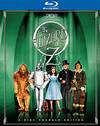





Show Boat (1929/1936/1951)
Awards | Articles | Bibliography | Downloads | Links | Image Credits
| Article 6 - 1951 Film |
THE SCREEN: A Musical Favorite at Radio Cityby Bosley CrowtherNew York Times, July 20, 1951 page 14Get along down to the levee (or to the Radio City Music Hall) and prepare for a joyous experience, for "Show Boat" is back in town! In a grand Technicolored production, all a-glitter with the glamour and romance of the era or the Mississippi gamblers and the bright floating theatres, this warm and beloved classic of American musical comedy is back on the screen to which it last came just fifteen years ago. Comparisons are not in order, out of due and solemn regard for the faithfully cherished memories of those who adored that previous film. For this Metro version of the great hit is so magnificent in so many ways, especially in its presentation of the lovely Jerome Kern-Oscar Hammerstein 2d songs, that any comparative estimation would have to say it puts that other in the shade. And that would, of course, be unreasonable to the fans of Irene Dunne and Allan Jones. But candor compels the observation that "Show Boat" has never reached the screen (it was also done, you may remember, in 1929) in anything like the visual splendor and richness of musical score as are tastefully brought together in this brilliant re-creation of the show. As a matter of fact, it is doubtful if even its first performance on the stage surpassed, except in novelty and freshness, this faithful translation that Metro has done. And to make up, indeed, for what shortcomings it may have on the novelty score, there is the excellence in this rendition of the old familiar songs. As often as one may have listened to "Make Believe" and "You Are Love," they still sound original and exciting as sung by Kathryn Grayson and Howard Keel. "Ol' Man River" has been blunted by thousands of bass baritones, yet it thrusts to the heart when William Warfield sings it on the banks of the muddy river in the misty dawn. (Mr. Warfield, we'd say, incidentally, has a voice that we want to hear more from.) And even though "Bill" is as banal as "La Vie en Rose" in the night club realms, it is haunting and moving as it ripples from Ava Gardner's throat. Also the background music that generously runs through the film, in Conrad Salinger's orchestrations, based on the beautiful score, is apt to the moods of the moment and is aurally superb. Adolph Deutsch's musical direction is better that George Sidney's on the whole. As a matter of fact, a few shortcomings may be found, if you're looking for same – notably in the cutting and in the performance which Miss Gardner gives. In the role of Julie, the singer who is found to have Negro blood, Miss Gardner is much more "dramatic" that even a showboat soubrette should be, which, along with poor cutting and too much close-up, ruins particularly her "Can't Help Lovin' Dat Man." Likewise, a big "heart" scene, written for Julie along toward the end by Scriptwriter John Lee Mahin, is something you'll just have to suffer through. We would say, too, that Madge [sic] and Gower Champion, while dandy young dancers, beyond doubt, are too sophisticated in their performance of the functions of the showboat hoofers, Ellie and Frank – most notably in their fancy stepping to "Life Upon the Wicked Stage." And we sadly regret the omission of the howling scene of the backwoodsmen at "The Parson's Bride." But those are just minor objections. Miss Grayson as Magnolia is a doll, combining all the wholesome spunk and beauty of Edna Ferber's original girl, and Mr. Keel plays the gambling Gaylord with devilish charm and idyllic manliness. Joe E. Brown, in the shoes of Charlie Winninger, is Captain Andy as true as you could wish, right down to the last heroic flourish of his bibulous "HAPPPP-py New Year!" And Agnes Moorehead henpecks with stern persistence as Parthy, the captain's loving wife. The sets, which include a full-sized showboat with belching double stacks and sternwheel, are in the best Metro tradition, which means as sumptuous as sumptuous can be. Even today, there's something thrilling about the Mississippi's past romantic charm. Just like Ol' Man River, "Show Boat" keeps rollin' along. © 1951 The New York Times |
|
Return to the Articles Index. Return to the SHOW BOAT main page. |
| Now in Print! |
|---|
| Now on DVD! |
|---|
Buy Videos & DVDs |
|
Buy Movie Posters |
|
Buy Movie Posters |
|
Classic
Movie Merchandise |
|
![]() Printer-friendly version.
Printer-friendly version.
![]() Return
to the top.
Return
to the top.
Last updated:
June 21, 2010.
Reel Classics is a registered trademark of Reel Classics, L.L.C.
© 1997-2010 Reel Classics, L.L.C. All rights reserved. No
copyright is claimed on non-original or licensed material.
Terms of
Use.









